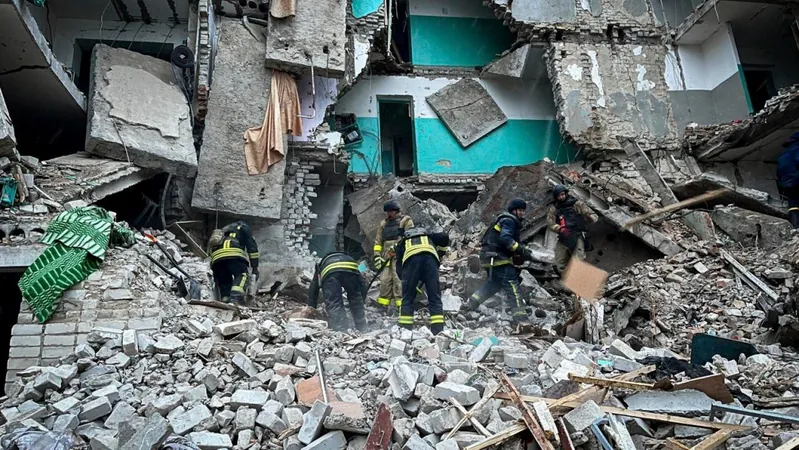
Prepare for Chaos: Trump's Controversial Tariff Threat Could Trigger a Border Crisis
2024-12-01
Author: Michael
Introduction
In a surprising move this week, Donald Trump has reignited tensions in North American trade relations by proposing a staggering 25% tariff on imports from Canada and Mexico. This unprecedented proposal is tied to Trump's promise to crack down on illegal immigration and the drug trade, as he prepares for a potential second term in office. With this shift in policy, border issues are set to become a key focus of Trump's platform once again.
Expert Warnings
Experts warn that this new tariff could exacerbate the already strained border situation. Richard Huntley, a former senior official with the Canadian Border Services Agency (CBSA), is sounding the alarm. He believes that many undocumented immigrants will attempt to flee from Trump’s anticipated deportation orders, leading to a significant surge at the Canadian border.
The Influx of Migrants
Huntley explains, “As soon as people hear about large-scale deportations, they’re going to run; they’ll look for any safe haven.” With Trump's controversial and often polarizing stance on immigration, Canada might become a prime target for those escaping potential deportation.
Strained Resources
The reality is stark: Canada shares the longest undefended border in the world with the U.S., a situation that Huntley fears may overwhelm the current capabilities of the RCMP and CBSA. He emphasizes that if we see an influx of up to 10,000 undocumented migrants, it would "throw our system completely off kilter." The aftermath of previous surges, such as the significant number of Sri Lankan Tamils arriving in British Columbia on a cargo ship in 2010, still looms large in his memory.
Canada's Refugee Resettlement ambitions
Canada sees itself as a global leader in refugee resettlement—indeed, the Trudeau government had ambitious plans to welcome 500,000 immigrants annually by 2025. However, Huntley's comment on Canada’s reputation as a “soft target” for asylum seekers rings true: many people view the country as a safe haven compared to the U.S.
Desperation and Human Smuggling
Desperation drives many of these individuals. Huntley recounts harrowing stories of people journeying from as far away as Africa and Central America to the U.S. and then attempting to reach Canada. “Once their lives are uprooted, I can’t blame them for trying to get to what they see as a better life,” he reflects.
The Dangers of Crossing
Yet, a dark side to this potential crisis reveals itself. Huntley warns that human smugglers or “coyotes” will find a lucrative market among those looking to escape. Criminal organizations will likely capitalize on the chaos, making it even more dangerous for individuals attempting to find safety.
Winter Risks
If large numbers begin attempting to cross the border, particularly in the harsh winter months, Huntley fears the consequences could be disastrous. He recalls tragic incidents, including a recent case where people died from hypothermia while trying to cross during a blizzard. “God help us if this surge begins in January or February,” he warns, highlighting the imminent danger.
Inadequate Resources
On a broader scale, the current resources deployed along the U.S.-Canada border could prove inadequate. Huntley emphasizes that while U.S. border patrol has advanced technology and armed vehicles, Canada’s enforcement capabilities seem woefully under-resourced by comparison. The Canadian government is reportedly considering bolstering these resources, but the effectiveness of such measures remains to be seen.
Detention Facilities and Asylum Process
The logistics of handling an influx of asylum seekers is another pressing concern. Currently, Canada has limited detention facilities, and if undocumented individuals are not granted refugee status, it complicates the process of returning them to their home countries—a task that is often costly and complicated.
Long-term Implications
Additionally, there are long-term implications for those who manage to remain in Canada but lack legal status. Some, like Cuban refugees, find themselves in a legal limbo due to their home country refusing to accept them back. Huntley highlights the importance of quick processing for asylum claims to avoid creating a situation where undocumented individuals become entrenched in Canadian society without resolution.
The Need for Preparedness
With the looming threat of tightened U.S. immigration policies, Canada may face a decisive moment in its own immigration strategy. Should the numbers increase as Huntley predicts, the need for more immigration judges and streamlined processes becomes essential.
Conclusion
The question remains: how prepared is Canada to deal with the fallout from Trump's renewed aggression on immigration? As we enter a new legislative year, officials must address these challenges head-on to prevent a potential border crisis and ensure a fair and just immigration system for all.









 Brasil (PT)
Brasil (PT)
 Canada (EN)
Canada (EN)
 Chile (ES)
Chile (ES)
 España (ES)
España (ES)
 France (FR)
France (FR)
 Hong Kong (EN)
Hong Kong (EN)
 Italia (IT)
Italia (IT)
 日本 (JA)
日本 (JA)
 Magyarország (HU)
Magyarország (HU)
 Norge (NO)
Norge (NO)
 Polska (PL)
Polska (PL)
 Schweiz (DE)
Schweiz (DE)
 Singapore (EN)
Singapore (EN)
 Sverige (SV)
Sverige (SV)
 Suomi (FI)
Suomi (FI)
 Türkiye (TR)
Türkiye (TR)